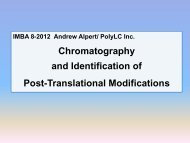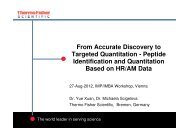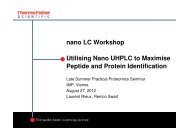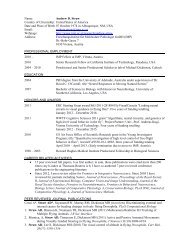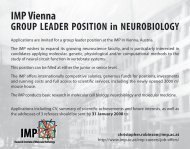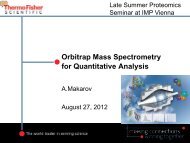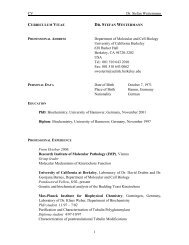IMP Research Report 2002
IMP Research Report 2002
IMP Research Report 2002
Create successful ePaper yourself
Turn your PDF publications into a flip-book with our unique Google optimized e-Paper software.
developmental pathways of thymus epithelium. One of<br />
our long-term goals is to test whether transplantation<br />
of genetically modified thymic epithelial cells can be of<br />
therapeutic benefit in autoimmunity.<br />
Figure 2: During their maturation in the thymus, developing T cells<br />
migrate from the outer cortex to the medulla. On their way, they can<br />
make contact with various types of thymic stromal cells. We want to<br />
understand how these interaction partners and the differentiation<br />
stage at which self-antigen is encountered determine the<br />
developmental fate of autoreactive T cells.<br />
predominantly cover abundant or ubiquitous selfantigens,<br />
while tolerance to the universe of tissuespecific<br />
proteins, whose restricted expression pattern<br />
precludes presentation in the thymus, would rely on<br />
post-thymic, “peripheral” mechanisms. However, this<br />
concept has been called into question by the emerging<br />
notion that numerous “tissue-specific” antigens are<br />
expressed within the thymus and displayed here for<br />
repertoire selection. We found that this „promiscuous“<br />
gene expression is a particular feature of medullary<br />
thymic epithelial cells (mTEC). The physiological<br />
importance of this phenomenon is underscored by<br />
Figure 3: Visualization by in situ hybridization of two cells<br />
expressing a „liver-specific“ antigen in a medullary region of the<br />
thymus (C = cortex; M = medulla)<br />
Contact: klein@imp.univie.ac.at<br />
findings that allelic- or strain-dependent variations in<br />
the intrathymic expression-levels of certain tissueantigens<br />
correlate with the susceptibility to organspecific<br />
autoimmunity. Along the same lines, we found<br />
that absence of central tolerance to a particular epitope<br />
of a Central Nervous System (CNS)-autoantigen due<br />
to intrathymic expression of a truncated splice-variant<br />
influenced the susceptibility to CNS-specific<br />
autoimmunity in mice. One focus of our interest is to<br />
understand the mechanism(s) underlying the<br />
expression of tissue-specific antigens and how this<br />
relates to the development of thymus epithelial cells.<br />
We are performing a detailed analysis of the phenotype<br />
of thymic epithelial cells in normal and mutant mice, in<br />
order to compare global gene expression profiles in<br />
various subsets of these cells and to elucidate<br />
29



